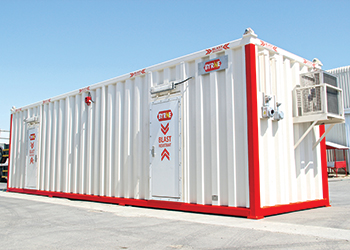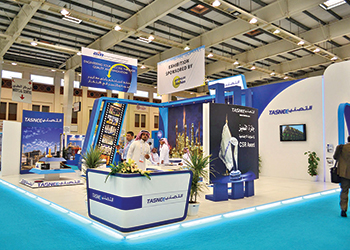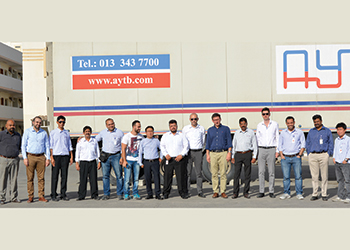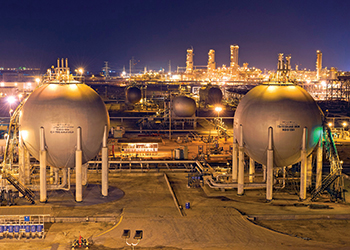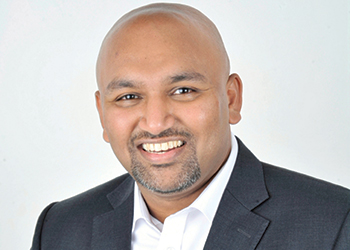
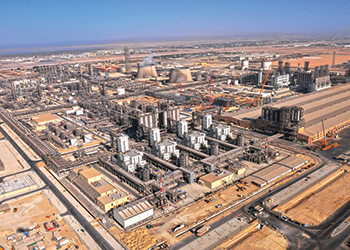 Jubail ... progressing at a mind-boggling pace
Jubail ... progressing at a mind-boggling pace
Among the targets that has been set under the NTP for the Royal Commission for Jubail and Yanbu, the most important ones include increasing the private sector’s new investments in industrial cities by 55 per cent from SR681 billion to SR1.07 trillion
The two cities of Jubail and Yanbu, the heart of Saudi Arabia’s industrialisation programme and run by the Royal Commission for Jubail and Yanbu (RCJY), have developed at a scorching pace that the Saudi government set the second highest budget for RCJY at SR41.5 billion ($11.06 billion) along with tough targets, as it rolled out the National Transformation Program 2020 (NTP) across 24 Saudi governmental bodies.
Among the targets that has been set under the NTP for the RCJY, the most important ones include: increasing the number of value-added manufacturing products by 19 per cent from 432 to 516 different products; increasing RCJY’s cities industrial production by 23 per cent from 252 million tonnes to 309 million tonnes; and increasing the private sector’s new investments in industrial cities by 55 per cent from SR681 billion to SR1.07 trillion.
In order to achieve these targets the government is considering many initiatives that are aimed to improve work efficiency and life conditions in the industrial cities, including building new residential, educational, entertainment, logistic and commercial complexes, which explain the large allocation of the NTP budget.
Saudi Arabia is determined more than ever to improve its value-added manufacturing base by depending on the industrial cities and the competitive advantage that it has on the petrochemical downstream activities, says Al Tamimi & Company in a report.
Significant initiatives include the development of new infrastructure in Yanbu Industrial City (including localising the renewable energy and rubber industries and establishing industrial gas and steam networks), Jubail Industrial City and Ras Al Khair Industrial City.
Recently the chairman of RCJY, Saud bin Thunayan, signed a number of contracts with national and international companies at a total value of SR1.88 billion.
The deals aim to implement a number of projects to attract and nationalise more investments, adding to establishing services facilities, developing infrastructures and industrial lands, and providing environmental services, according to Saudi Press Agency (SPA).
The Royal Commission also inked three contracts with a specialised firm to develop a piece of land on a total area of 600 hectares at Ras Al Khaimah Industrial City to use it for the basic and secondary metal industries and other related mining industries.
The signed agreements include a contract to engineer, supply, and establish a subsidiary power plant in Ras Al Khaimah Industrial City and another deal to divide and develop the industrial zone of the city.
Moreover, a contract to improve Ar Reggah neighbourhood was also inked, the statement added.
 |
Thunayan ... signing a number of contracts |
The cities contain Saudi Arabia’s leading petrochemical and minerals clusters and are a main contributor to the country’s economic growth. Jubail is home to Sadara Chemical Company (Sadara), the world’s largest chemical complex ever built in a single phase, while Ras Al Khair is building the world’s largest aluminium smelter – and Saudi Arabia’s first. The smelter is the cornerstone of Ras Al Khair Industrial City, which is fast becoming the country’s aluminium and phosphate centre, 90 km north of Jubail.
It is estimated that the RCJY accounts for 65 per cent of industrial investment in the entire Gulf region and has a 20.2 per cent average annual growth rate in terms of foreign direct investment (FDI).
According to Yanbu Industrial City Economic Review, Jubail and Yanbu currently produce approximately 10 per cent of the world’s petrochemicals production. RCJY, which is also now developing Ras Al Khair Industrial City, together contributes SR144.7 billion or around 12 per cent to the kingdom’s GDP and to 65 per cent of the domestic industrial output.
The cities’ combined output of petrochemical and refining products, among other items, feed the needs of local industries, leaving large volumes for export. They are responsible for more than 71 per cent of total Saudi exports, while the non-oil exports of the commission cities amount to 85 per cent of all kingdom exports in that category.
The two cities are also home to some 630 manufacturing enterprises of which some 98 products have been deemed to be essential and the kingdom has benefited from the transfer of technology. Jubail and Ras Al Khair currently employ an estimated 140,000 people, which is predicted to rise to 190,000 by 2021.
RCJY has also launched an initiative to adopt renewable energy in Yanbu Industrial City, as part of the National Transformation Program 2020.
The RCJY added that SR595 million worth of investments were attracted to the Yanbu Industrial City, noting that the initiative aims to attract industrial investments of more than SR1.5 billion until 2025, according to a statement released.
Meanwhile, the Custodian of the Two Holy Mosques King Salman has inaugurated 242 industrial and development projects worth SR216 billion for the RCJY, Saudi Aramco, Saudi Arabian Basic Industries Corporation (Sabic) and the private sector.
The King also laid the foundation stone for the Economic Centre in Jubail Industrial City.
Welcoming the King, Prince Saud Bin Abdullah Bin Thunayan, Chairman of Royal Commission for Jubail and Yanbu, said the Commission’s pursuit for integration with its partners comes in the framework of its commitment to excellence.
"The Commission uses its facilities, capabilities and raw material to competitive advantages that rely on skills, innovation and modern technology making it possible to provide an attractive investment environment pushing the private sector to participate effectively and succeed in the localisation of petrochemical, mining and manufacturing industries. This was confirmed by the success of Sabic as it was ranked 4th global petrochemical industry," he said.
Welcoming the King, Minister of Energy, Industry and Mineral Resources Khalid Al-Falih said: "Today our dear country under your wise leadership is anticipating tomorrow’s promising features in the framework of the ambitious Vision 2030."
He said the "Plus Chemo" project, which is a world-class complex for chemical and manufacturing industries, is expected to attract quality investments estimated at SR20 billion and generate about 20,000 new jobs. Neil A Chapman, President of ExxonMobil Chemical Company, said that his company is proud of being a reliable business partner in the kingdom for more than 85 years and one of the largest foreign investors in the kingdom.
.jpg) |
Work in progress at a facility in Jubail Industrial City |
"Our decades-long relationship with Saudi Aramco, Sabic, and Royal Commission for Jubail and Yanbu represents the cornerstone of our success here in the kingdom, where our common projects in Al-Jubail Petrochemical Company (Kemya), Saudi Aramco Mobil Refinery (Samref) and Yanbu Petrochemical Company (Yanpet) achieved impressive results in providing opportunities for training and development at a global level in addition to offering career opportunities for thousands of young Saudis," he said.
He said the Kemya company successfully achieved the Saudi rubber project with investments worth SR13 billion. It will produce specialized rubber products, enhancing the diversification of the kingdom’s economy in line with the its Vision 2030.
Executive President of Total Company Patrick Bojan the joint venture of the Satorp Complex with Saudi Aramco in Jubail includes a refinery and a petrochemical facility with investments worth $13 billion.
President and Chief Executive Officer and Chairman of Dow Chemical Company Andrew N Liveris said: "We have been dreaming of this day and we are working to achieve it for nearly a decade."
He said that 26 manufacturing units affiliated to Sadarah will have a combined production capacity of more than 3 million tons of plastics with a high value, performance and specialised chemical products per year.
To continue the development work of Jubail and Ras Al Khair industrial cities, the RCJY recently awarded a five year contract extension to Bechtel, which has worked on the Jubail project since it began in the mid-1970s.
Bechtel is a key part of our team and they have played a major role in helping us to plan and implement the growth of Jubail and Ras Al Khair," said Dr Mosleh Al Otaibi, CEO, Royal Commission for Jubail. With their help and partnership we will continue to develop these cities which support Saudi Arabia’s economy."
Over the next five years, Bechtel’s work will focus on providing residential accommodation and education facilities such as an 18,000-student ‘greenfield’ university as well as roads, bridges, medical centers, and power, water and waste facilities.
One of the biggest elements of the RCJY’s budget under the NTP is for developing value-added manufacturing and transformation products. Currently the limited chemical conversion industrial base in the Eastern Province means that most relevant petrochemical output is used for basic chemicals and polymers and only relatively small amounts of speciality chemicals and end use products are produced. The establishment of a downstream speciality chemicals and end use product sector is seen as critically important in establishing a higher added-value manufacturing industry, the report observed.
Towards that, projects of the Sadara petrochemical complex in Jubail, a $20 billion joint initiative between Saudi Aramco and The Dow Chemical Company, are nearly complete and will begin supplying to global markets including China where there is a particular appetite for plastic products which Sadara will help satisfy.
The Sadara complex, located in Jubail Industrial City II, launched its first production plant in December last year. Its first product – linear low density polyethylene (LLDPE) – was produced in the company’s polyethylene plant using proprietary technology from The Dow Chemical Company. In August this year, it started operating its mixed feed cracker (MFC) at the venture’s petrochemical complex in Jubail. The MFC is the only one of its kind in Saudi Arabia and will allow Sadara to produce a diversified range of plastics and chemical products.
It is one of 26 manufacturing units located in the $20 billion Sadara chemical complex in Jubail Industrial City II. Of these units, 14 will deliver products that are completely new to being produced in the kingdom.
The state-of-the-art MFC allows Sadara to produce its own basic chemicals on-site, and subsequently to convert these basic chemicals into a wide range of value-added plastics.










































































